Join the discussion below

Dr. Mindy Pelz is a renowned holistic health expert and one of the leading voices in educating women about their bodies. She is on a mission to start a women’s health revolution! Teaching her signature “5-Step Approach”, Dr. Mindy has empowered hundreds of thousands of people around the world to... Read More

Anna Cabeca, DO, OBGYN, FACOG, is triple-board certified and a fellow of gynecology and obstetrics, integrative medicine, and anti-aging and regenerative medicine. She has special certifications in functional medicine, sexual health, and bioidentical hormone replacement therapy. For the past 20 years, she’s served 10,000+ women in her private practice— and... Read More
- Understand the profound impact of balancing hormones during menopause, and how this singular focus can drastically improve your well-being, including weight management, a healthy sex life, and overall happiness
- Embrace a Keto Green lifestyle by consuming a diet rich in greens and healthy fats, engaging in regular exercise, practicing gratitude, and dedicating time for self-care – all of which will positively influence your menopausal journey and life in general
- Recognize that while menopause is a natural and inevitable phase of life, suffering through it is optional; learn how to gracefully navigate and embrace this period, which the Japanese poetically refer to as a ‘second spring’
Related Topics
Aces, Aging, Bioidenticals, Cortisol, Estrogen, Evolution, Glucose Fuel, Healing, Hormone Imbalances, Hrt, Insulin, Intermittent Fasting, Irregular Periods, Keto-green Lifestyle, Lifestyle, Menopause Hormones, Neurological Symptoms, Oxytocin, Perimenopause, Pms, Progesterone, Progestrone, Puberty, Reproductive Hormones, Second Spring Of Life, TraumaMindy Pelz, DC
Here’s where I want to go with you: Because for people who have been listening, you and I have had so many great conversations on your podcast and my podcast. I mean, you and I could talk about hormones all day. But here’s my new insight, and what I’d love to bring to the world: I feel like as we go through menopause, there’s like that neurochemical armor that protects us goes away. When it goes away, estrogen and progesterone, those two hormones, activate serotonin, dopamine, GABA, and acetylcholine. We’re talking about more than just hormones. We’re talking about neurotransmitters. When all of that goes away, you are left with trauma. You’re left with figuring out how to manage stress. You’re left having to recreate your life in a new way because of the loss of hormones and neurotransmitters. My first question to you is, Can you expand on that? What do you think of that theory? How do we help women through that journey?
Anna Cabeca, DO, OBGYN, FACOG
Oh, my gosh, Mindy. I’m so glad you’re talking about this, because what I say is that you get to menopause and you feel like you’ve been living in a pressure cooker. Your lids have been solid. You’re holding it together. Then, all of a sudden, progesterone drops. I call that the lid to our pressure cooker. You can imagine that the lid of the pressure cooker now blows up. So what happens? It is a hot mess. But what’s happening neurologically? Now is what’s so fascinating because, as a gynecologist, patients during perimenopause and menopause come up and say, Okay, in this time period, they are having worsening PMS. This started 10 to 15 years ago. They’re having PMS symptoms. That’s mood swings just one or two weeks before their period starts. They feel better for one or two weeks. Then the mess starts again. As a gynecologist, I see irregular periods, worsening PMS, heavier than normal periods, and breakthrough bleeding, and what often happens is that it leads them down the road to birth control pills that do not work. Endometrial ablation, maybe, and a D&C, and then maybe that works or doesn’t work, or a hysterectomy. We fixed the victim to the baths of hormone imbalances by removing the uterus. I consider the uterus to be the victim of hormonal imbalances. But at the same time, these irregular cycles are happening: difficulty sleeping, mood swings, memory loss, loss of sexual drive, chronic fatigue, and crashing fatigue. Maybe there are heart palpitations in there. Maybe there’s some restless leg syndrome in there, the insomnia, difficulty staying asleep, more so in getting to sleep. All of those are neurologic symptoms. Here’s this mass of symptoms that are coming in relation to this hormonal change. So, as a gynecologist, I really wanted to understand why the mess? Why did I experience that? That’s why I wrote about it in my book, The Hormone Fix. It takes more than hormones.
Mindy Pelz, DC
I love The Hormone Fix, by the way. I think it’s one of the best books ever written on hormones. In fact, I don’t know if you notice whenever people ask me, What other books have you read on hormones? I’m like, everybody needs to read The Hormone Fix. So anyway, I just had to tell you that.
Anna Cabeca, DO, OBGYN, FACOG
Thank you for that. I feel the same way. It’s my Magnum opus, and if I hadn’t lived, how would I have lived? I wouldn’t have known the stories that I write about are the results, how to get out of this crazy pressure cooker of our lives. What’s fascinating is that during this time, we know these symptoms increase, and that’s because these symptoms are hormone-dependent. There’s this hormonal function, so our brain’s ability to use glucose for fuel is hormone-dependent. What’s really important to understand is that these hormonal changes have a neurologic component, mainly because our brain is starving for fuel. Why are these gynecologic symptoms related to these neurologic symptoms? As I looked at this and some of the recent research that showed that gluconeogenesis in the brain is hormone-dependent, estrogen-dependent, and most likely progesterone-dependent, When we start getting that drop in progesterone, we start seeing a spike in these neurologic symptoms: anxiety, mood swings, and depression. Some may call them bipolar symptoms. I call them hormonal symptoms because our brains are starving for fuel. That’s why we have to shift to keto. I call it a keto-green lifestyle shift into intermittent fasting so that we can bump our body periodically into ketosis because we’re not using glucose very well when our hormones are low. Even if we’re supplementing with exogenous hormones. Even when our hormones are running well.
Mindy Pelz, DC
Can you expand on that? Because I do believe one of the interesting discussion sets now emerging in the menopausal world is around HRT and bioidenticals. I think we swing the pendulum from not using any of that to now we all should use it. But where’s lifestyle in that conversation? So talk about why, even if you’re on those, why is it important to have access to ketones?
Anna Cabeca, DO, OBGYN, FACOG
Yes, absolutely. It’s almost like when you think of biology and psychology, you can’t separate the head from the body. The same is true with hormonal therapy. I mean, you can’t separate the lifestyle from the hormonal therapy. If the prescription is less than one percent to 10% of the answer, I still like to give myself credit as a prescriber. It’s going to make a bigger difference, but it’s the one at 10%. It’s not 90%. 90% is the lifestyle because it’s not just these reproductive hormones, although estrogen and progesterone with or without a uterus well into postmenopause topically is one of my preferred. That’s like a lifetime plan for me with what I know and the research I’ve done on how I help patients. That is for sure progesterone, bioidentical, topical, with or without a uterus. I’m sold on it, and I’ve been doing research on it for over 20 years. I think that’s important to understand. But beyond that, we’ve got to do the lifestyle; you have to create that hormone hierarchy. We have all our hormones, but insulin and cortisol are managing hormones. Oxytocin is the most powerful hormone in our body. Now, when we’re under inflammation or stress, I don’t care how much your dosage of hormones is; you’ve got to address these other major hormones. We do that predominantly through our lifestyle. We can look at some peptides, we can look at some stem cells, and we can add some of these additional things to our arsenal. But you’ve got to do it with lifestyle, not the other way around.
Mindy Pelz, DC
Great. Where do you think trauma fits into that? Because I can only share what I’m experiencing in my menopausal journey is that I feel like, at 53, the traumas are coming up. Even more and more are saying, Heal me, heal me, heal me. I almost feel like I don’t know if it’s wisdom. I don’t know if it’s because my hormones are now really shifting into this more post-menopausal state. But I’m looking at them as gifts, like you and I jumped on this and talked about rest and how we’re learning to rest a little bit more. But there were a lot of traumas I had a long time ago. I don’t know if I had a near-death experience in my 30s when I swam into a pile of Portuguese man-of-war. Ten of them, actually, they wrapped all around me, and I ended up losing my life. I had the life review, I had the tunnel, I saw the white light, like the whole thing. And I came back, obviously, and it was a trauma I never dealt with. I’m finally dealing with it this year. I feel like it’s menopause that’s allowing me to see it more clearly. To me, it’s tied in to the loss of estrogen and progesterone and the changes that are neurochemically happening. If we look at this as a gift, there’s so much healing that can happen for us in the menopausal journey. I know your story with your son, and just that really touched me when I read it in The Hormone Fix. There are opportunities for us here if we don’t push them down.
Anna Cabeca, DO, OBGYN, FACOG
1,000%. Menopause gives you the opportunity to heal what we’ve buried. I think it’s really important to honor the experience we’ve had because there’s been a reason for it. We have to use that experience. I would say there’s a reason for everything we’ve been through. No, but we can make reason of everything we’ve been through and learn from it. That’s really powerful. That’s a powerful mantra for me. Like, Okay, how can I transform this into a meaningful next step? Menopause is this opportunity, this blessing to walk into a new phase of your life. Yes, our. And I see it that way, too, Mindy. I think, and having worked with so many women going through this transition, I always tell them, number one, that menopause is mandatory and natural. Suffering is optional, so remember that and write that one down. It’s a good mantra. The second thing is that just like puberty is a natural life stage, menopause is too, and no more should we be suppressing menopause as we should puberty. That means no birth control is needed in that pubertal time because we are suppressing natural transition, rewiring, and programing change. So we shouldn’t be doing that in menopause through birth control pills; we’re not honoring the neuroendocrine connection. Like I said, that progesterone dips, and that pressure cooker lid comes up. Women who have had, and this is well documented in the research, especially looking at women veterans and those who have had adverse childhood experiences, or ACEs for short. We see a more difficult time in menopause. That is, again, we have a scar formed over the wound, and now we have a time to really open up that wound, clean it out, and walk into the second spring of our lives. Embodied understanding the scars and experiences with that wisdom, with that learning, and with that grace and compassion for other women, men, and children I think that’s by design, who were physiologically able to evolve into. Should we accept the challenge?
Mindy Pelz, DC
See, that’s the rebrand of menopause that I want the world to hear, because we either don’t talk about it or we’re like, we try to Botox the shit out of ourselves and slow the aging down. We try to look like, I know I’m always like, Hey, this is all natural right here. We try to make it so that we can stop the journey.
But what I’m learning as I’m in the thick of it again, I’m really close to that one-year mark of being in that post-menopausal place is that I’m learning a new part of myself. I even had this thought. I’m so curious what you think of this: that estrogen really makes us maternal. When we lose estrogen, we lose a little bit of that maternal.
But that’s the way it’s supposed to be, because we’re supposed to mother ourselves now. We’re supposed to turn within instead of mothering the whole world. This is a new theory that I like. In the last couple of days, I was like, I feel more connected to myself as I handle some of the traumas from my 30s and my 40s. As I handle those, I go within and practice more self-love.
I’m finding that I have more space and some emotional capacity to love myself than ever before. I don’t know if that’s because of estrogen loss. I don’t know. But I really love who I’m becoming.
Anna Cabeca, DO, OBGYN, FACOG
I think this is becoming. That word, becoming, write it down, highlight it, circle it, becoming. I mean, we are becoming our next best selves. There is this hormone transformation, just like that child transitioned with puberty into young adulthood. We transition in pregnancy, we have children, and we transition in menopause into the next best version of ourselves.
What is the next best version of ourselves without all those reproductive hormones that make us almost unable to deal with a lot of those traumas?
Mindy Pelz, DC
Please. Explain that, because that’s what I feel. But I’m trying to neurochemically explain it.
Anna Cabeca, DO, OBGYN, FACOG
I wish I could. I wish I could. It’s very intuitive at this point. But if we think about it, it is this transition. We lose DHEA, we lose progesterone, and we lose estrogen, in that sequence. So progesterone is even more so than estrogen. I think that, and because we knew it’s such an anti-inflammatory neurologic key hormone, even more so in my work than estrogen is.
But in this transition, you go from these very, like you said, maternal hormonal levels. These reproductive hormonal levels into this next phase, which should take us to, we take away that clouding that level of those hormones. We should have this ability to and through history and other cultures, have a higher connection with spirit and God.
So many women through this time period will have a higher connection. This is where many second careers, then to sisterhood or to be a nun, happen after childbearing years. What has happened after childbearing years throughout history in women who have gone on to do amazing things? The other piece too, I think, Mindy, and I’m trying to understand it as well, is to understand all the hormonal connections because there are so many more and how these all tie together, and we don’t talk enough about oxytocin, that hormonal connection bonding, and really being able to increase the amount of oxytocin we make.
There is a mission for people to fast like that fast stream oxytocin or fast track oxytocin through journeys with plant medicine, with psychedelic medicine, with things like this to have that ability to kind of remove the cloud, break through the muck and the yuck, and then there may be a place for that, but I think what it comes down to is where we’re naturally going through this menopausal journey is not to suppress it, it’s not to suffocate it, it’s not to pretend it is not happening, but it’s to own it, and then to again, take do what your body needs to do physiologically to gain that higher energetic vibration and connection without all our reproductive hormones.
Mindy Pelz, DC
Yes, I think that’s so well said. It’s interesting you bring up the plant medicine and psychedelic because I’ve been speaking of this. When you look at the research, it’s pretty impressive. Even if you just look at psilocybin and you look at its ability to activate serotonin receptor sites that are the same ones that estrogen was activating or a little bit that you still have left is activating, but more importantly, what’s really interesting in the mental health world that I’m witnessing is that there’s an emergence of us using plant medicine and psychedelics to understand ourselves better. If you just take that concept and go, Okay, well, menopause is also an opportunity for us to understand ourselves better. Can it be a tool to heal trauma?
Just like I’m very curious about EMDR, I’ve been experimenting with that in my own life and using ways to really not push these traumas down but invite them up so that they can be healed. We can step in to hear what you said and how you said it. It is like becoming the next best version of yourself. I think we need a toolbox of emotional healing tools we can use. If you were to create that toolbox, what would you put in it?
Anna Cabeca, DO, OBGYN, FACOG
Well, definitely. Like with my book, The Hormone Facts. I talk about some of those in my trauma section. EMDR is one of my favorites. That’s a fast track through trauma. EMDR is very beneficial, and I’ll tell you because we were talking about retreats and having to get away, and I told you I went to Mexico. I went on a journey to Mexico because I was burning out fast. It was a very stressful year. Then my book, Menopause, just came out. I did great. But there were a lot of changes and challenges, some amazingly good and some really bad ones. So I was having a rough year. I went to Mexico, technically for a week. I just had in the jungle, I just had this time to myself, number one. And number two, I did an experiment with Ayahuasca. I did Ayahuasca eight years ago, and then I did it again. It was a very gentle journey, which is very typical for Ayahuasca. And the experience through that, what I learned is that, number one, when you’ve had trauma and past trauma, you may have it may take you a lot more of these plant medicines to trigger a response. You may be a low-DMT secretor. So that’s number one. I learned that, and it’s kind of interesting. I really haven’t seen so much research about it. But in general, that may be something that’s going on. Number two is that it doesn’t have to be no pain, no gain. You don’t have to have pain to get tremendous results. You can feel loved; it can be slow; it can be comfortable; and it can be fun. You don’t have time to yourself like I do; that was a big message that came through plant medicine, or having time to myself and my mental space to rest and rebalance. I was recognizing that it doesn’t have to be painful. I don’t have to push the wheelbarrow up a hill to get to where I want to go.
And sometimes I do, but I don’t have to do that every single day. I think it’s sometimes taking this perspective here and in our midlife transition as we’re becoming the best next version of ourselves to look at. Number one: What are all the things I love about myself? What makes me unique? What makes me this way? Like, what do I look at and honor for myself? I’m doing this in The Girlfriend Doctor Club Community. I have them that when they see a mirror, they’re going to go look at that mirror, and they’re going to focus on everything they like, positive about themselves. Or even just start with one thing. and you look at that mirror. Is your first thought negative or positive? Are you first critical or complimentary? If you are the latter, awesome. If you are critical, we’ve got to reprogram your brain. That’s part of EMDR. You can do that. It’s part of recreating really good habits. So you’re living your best self too. In life, we have this opportunity to do that, and then we’re modeling it for the next generation so that they’re focusing on the good in the world and the good in life.
Mindy Pelz, DC
You and I have talked about this before. I am such a believer that as women go through the menopausal journey, they learn about their hormones and they understand their feminine selves perhaps, for the first time. That we have a bit of a societal responsibility to go back down to the younger generation and start teaching them because they are living in a worse toxic, physical, emotional, and chemical mess than we grew up in.
You brought it up; it’s so interesting that you’re bringing up the journey you did, because I just did a journey that was very similar. I did it with MDMA, and psilocybin is going to be legalized in America in a therapy-assisted way in the next couple of years. I actually did an MDMA and psilocybin journey with a therapist and a psychedelic specialist.
What was really interesting was the container of having two beautiful women who were so knowledgeable to sit there with me and lead me, and hug me, and nurture me through an experience where I could go back and process old traumas. It made me not only feel so incredibly loved, but it also made me realize that as a woman, I actually think that as we go through menopause, it’s a beautiful opportunity for women to gather together and nurture each other, and that we have to stop trying to do the menopausal journey alone.
We are meant if you just look at oxytocin, we are meant and built for connection. How do we, when I look at society, start to create more connection amongst women, not competition and collaboration, and comfort each other as we go through this ex hormonal dramatic change? What would a world like that look like?
Anna Cabeca, DO, OBGYN, FACOG
Oh, my gosh. I think the first thing that comes to mind is that you’re already doing it. Keep doing what you’re doing, Mindy, and have fun, enjoy it, and pace yourself. The second thing is to love who you are. Start with loving who you are. Something I’ve learned through my own trauma and trying to fix everyone else was that until I focused on myself, on to focus on healing myself, and on prioritizing myself, my kids weren’t healthy until I started doing them. Then they were healthier overnight. They were more at peace, more calm, and less anxious overnight. It was just because I did. As a woman, drive where energy is. We’re energy. We have energy bodies. Are we sucking the energy into this negative, frantic cycle downward, or are we vibrating at a high level? That’s magnetic magnetism.
I love those words: magnetism and magnificent. Are you a magnificent human? You are a magnificent human. You vibrate at a high level. People are drawn to you. So you’ve got to have your boundaries. You’ve got to have your tank full. If you don’t, you’ll be empty. All the best intentions will happen, and so you have to continuously refuel, refill, prioritize, and do the little things that matter on a daily basis that are part of self-love. I give out in my packages sometimes this card, this postcard, that says self-love is your highest frequency. I found that to be so true. I found that to be so true. When we’re hormonally a mess, exhausted, and we’re exhausted and we’re depressed, it’s hard to feel that. So you just have to take one right step at a time.
Mindy Pelz, DC
I feel like if I look at my journey after 40, as I started to lose hormones, I actually did the opposite of what I’m doing now. I turned outside and looked at everybody, and I was like, They’re annoying me; they’re irritable; this situation is bad. It was a very outside-in approach to my own mental health, hoping that everybody in my life would change so I could be happy.
But as an adult, it sounds silly. But then, as I came into my 50s and where I sit today, I don’t want to lose sight of something you said because it was so brilliant, which is that as I’ve taken ownership over these traumas, as I’ve taken ownership over my mental health, as I’ve done the work and gone in and changed my own vibration, I’m looking at everybody around me and I’m like, Wow! They’re all changing now.
And yet we don’t do that just in a society. We don’t do that. We are like, You are making my life miserable. But what if there was a reframe of something within me that is making you reflect back to me what I need to work on?
Anna Cabeca, DO, OBGYN, FACOG
Exactly. I’m seeing in you what I need to deal with. When you’re irritated, when someone rubs you the wrong way, when there is that friction, that electrical friction or physiologic friction, think, Okay, well, what is going on? What is that telling me about me? Where is the rub? Where is that rough edge that I still got? I mean, I think that’s why we can live to be old. I’m going to live to a very old age because there are a lot of rough edges that I could work on.
Mindy Pelz, DC
Me too.
Anna Cabeca, DO, OBGYN, FACOG
It’s a long time.
Mindy Pelz, DC
I know. That’s how I feel. I might shoot. One of my goals is to live to be over 100. I’m like, if I get to live over 100, I’ve got some work to do on myself to make sure that I can make it there. If you were to create a roadmap for a woman at 40, because I feel like 40 is that pivotal moment where you have an opportunity to start to shift your lifestyle, You and I have had so many conversations around the keto green approach, fasting, mocha, and all those things. I still feel like those are an exogenous sort of tool. There’s a mental health tool that I would love the 40-year-olds to know, or even some wisdom that I would love the 40-year-olds to know as they move into that perimenopausal time.
I haven’t quite been able to put words to it, which is why I want to have a conversation with you about it. What can we do to help women going into the perimenopausal years, from an emotional and mental standpoint, to process this stuff that will show up?
Anna Cabeca, DO, OBGYN, FACOG
Well, first, it’s like the word that comes to me is Oxyplay. That’s one of my hashtags. Oxyplay, it’s so good you increase oxytocin. Everything you can do, I think, on a daily basis. How am I increasing? How did I increase oxytocin today? That’s the first thing because that’s the most powerful hormone in our body, the most acclimatizing, and, I think, the most anti-aging, the hormone that will get us to contract. When we are stressed, and I’m going to back it up because 35 to 38 I think that’s really a transition.
Mindy Pelz, DC
Yes, I agree.
Anna Cabeca, DO, OBGYN, FACOG
It’s the preclinical hormonal changes that are starting during that time that are leading them to disassociate from the work they love, the person they love, their marriage, and different things during that time. If women can look back to that time period now and see what was going on between ages 35 and 40, they’ll say, I didn’t realize that, but my hormones were changing then. I didn’t realize it. Yes. I got a hysterectomy, I had a tubal ligation, I had this change, or I was dealing with this when my thyroid started acting up, or whatever it may be. It’s typically that time period now that is not defined in the sphere of endocrinology, and I have not seen any new additions to address that.
But it’s what we have to start asking women. I would ask everyone who’s listening: if you’re over 40, if you’re over 50, what’s happening from age 35 to 40? I think in the lives around you during that time period, that’s when that hormonal imbalance is coming in. It’s usually higher cortisol and lower oxytocin. To heal from trauma, you need a safe space and companionship. Like the beautiful women that were around you during that time, you had to feel safe. To have a good orgasm, you have to feel safe. Produce oxytocin. Oxytocin with an orgasm, those are things that I think have to be part of that. Creating a safe space, creating a safe community, being authentically you, loving your smile lines and laugh lines, seeing everything naturally on the interior and exterior, inside out and outside in, to continue that, but to age gracefully and well, But to love how you, when you look at yourself in the mirror, to love the battle scars that I show up with them, to really focus on those things. So for me, it’s Oxyplay, funny movies, funny books, funny people, funny friendships, a good, safe community, and giving philanthropically. All the things: playing with pets, playing with kids, going into a playground, doing things stop and stop, doing the things you love, like keep doing the things you love. Often, we take those things off our schedule because we’re too busy.
Mindy Pelz, DC
Yes. The other thing that happens to us during that transition is we’ve got kids turning into teenagers.
Anna Cabeca, DO, OBGYN, FACOG
I’m 57 with a 15 year old, can we talk?
Mindy Pelz, DC
God bless you. You need more Oxyplay.
Anna Cabeca, DO, OBGYN, FACOG
I got two decades of raising children.
Mindy Pelz, DC
Yes. You’ve got kids turning into teenagers, you’ve got aging parents, and you’ve got responsibilities that are mounting. Again, when I go back and I look at that time period for myself, I am just overwhelmed. I almost have so much compassion for myself because I didn’t Oxyplay. I got more serious. The more serious I got, the more hormonal imbalances that I got.
So, how in that rushing woman lifestyle with all of these responsibilities, what does Oxyplay look like? Do we have to schedule Oxyplay? I feel like we need to highlight that. How do we help women free up their seriousness?
Anna Cabeca, DO, OBGYN, FACOG
What it does, it starts with shifting the energy of the day. So I think back to when I went from being really sick, suicidal, inflamed, and infertile to being able to smile and laugh again. To have my family love me back. I love them. But I didn’t feel like they loved me back, and I feel that authentically. I started my day with these three questions: I ask myself. Maybe they’ll help our listeners, too, Mindy, but I always say, Where did I see love? Where did I see love today? Or Where did I see love yesterday? Where was I loving? Where did I laugh? Or could I have laughed at myself more? What am I grateful for? So those three questions on a daily basis, and all of those are intended to increase oxytocin.
That creates a shift in your physiology, which we can measure, to a more alkaline physiologic state, which reduces the acidity within our mindset and within our physiology, and we can measure that with urine PH. I think that’s a really valuable thing. We can start by just looking at what things are stressing us out. Where do we shift our physiology through our mindset, let alone our diet and lifestyle, to be more alkaline? I think if we can start measuring, then that was eye-opening for me because when I figured it out and started checking my urine PH, I was literally peeing acid like battery acid levels. I was so stressed. You can eat the most perfect diet. But If you are in a high-stress state or a physiologic distress state, you’re going to be acidic. It’s true that when we compile a highly acidic diet to that, that’s going to be extra problematic. So you may do well for a little while, but then you’ll hit a roadblock.
I think it’s that starting the day and, just like what gets measured gets managed,between using a continuous glucose monitor to see how you’re being stressed physiologically to check in urine PHI thinks those are starting a really important gratitude practice, prayer practice, and having a support group. For me, I was part of a group called the Beloved Single Moms Group. It was humbling for me as the doctor, the well-known doctor of our small island. But it was critical for me to have that good, safe community that knew what I was going through. Creating those communities is part of our safety.
Mindy Pelz, DC
I think safety is a word that keeps coming up in my menopausal journey, as like the body, the female body cannot do what you want it to do. It goes down even into the childbearing ages when you don’t feel safe. I think again, what I’m pulling from what you’re saying and what I’m seeing in my world is that when women come together and we nurture each other and we support each other, that’s where safety starts.
Mindy Pelz, DC
When we’re out trying to compete against each other or we’re trying to compete against men, or play in the same sandbox as a man, we often don’t feel safe. I think the word that I’m feeling needs to emerge for women right now is where and how can we feel safe? Because when you feel safe, all your hormones will balance.
Anna Cabeca, DO, OBGYN, FACOG
When this is such a key area. Because here, how do you address your aging? You’re in your 50s, and you’re seeing these lines come up, and there’s fear. When you’re in fear, that’s a state of acidity. When you’re in a state of self-love and acceptance, you’re in a state of alkalinity. You’re either making decisions based on fear or based on love. If we look at where we are, I just think, poor Madonna, like, what was she thinking? She had all these filler and bottom issues. Doesn’t look like she’s beautiful. It sounds like I’m in love with her natural aging. I know, I’m like, Oh, my God. that is based on fear.
Actually, it’s based on fear, which will not serve us. Actions based on fear will never serve us. We first create that safe space for ourselves. We create it by reflecting on the one, maybe it’s just one thing that we really love about ourselves, and we build it from there. Then you start training your mind to focus on what you love versus what you don’t like. You have to really work at it. We have to continuously work at it. But what do you think, Mindy, here facing 50s and 60s wrinkles? How do you move? How do you create safety when you’re fearing the aging process? Because, number one, we haven’t been brainwashed to fear it.
Mindy Pelz, DC
Yes. I’ll tell you, for my own self, I just had this the other day where I actually am using my wrinkles and my gray hair, just as an acknowledgment of wisdom, and then also just as a lifestyle. We talked when we first started. I’ve just been out promoting Fast Like A Girl. I’m ready to slow things down. The other day I looked in the mirror, and I was like, Whoa, you’ve got some grays, girl. They’re showing up. But the way I looked at it was, maybe it’s time to slow the pace down a little bit. The gray hairs are just telling you, Hey, maybe it’s moving a little faster than the aging process needs to do.
And then I thought, I could color them, but I was like, No, I don’t want to color them because they’re like wisdom strands. They’re there to teach me and show me where my lifestyle fits into the whole aging process. I’ve thought a lot about it, especially in conjunction with the fact that people, celebrities, and even other health influencers are really Botoxing the heck out of themselves. Sometimes it’s easy to stand up there and say, My lifestyle, look how amazing it is. Look how amazing my skin is. We don’t realize that that person has manipulated it in some synthetic way. I feel like the natural aging process is feedback for me.
Anna Cabeca, DO, OBGYN, FACOG
Yes, I’m so glad you said that, because it is. Absolutely. I feel the same way, like using my wrinkles whether I’m hydrated or dehydrated, as I am still covering my gray hairs. There are just a few there, but I’m still like, I’m not perplexed.
Mindy Pelz, DC
Yes. Some people have a lot of gray. I have friends that say if I didn’t color it, I’d be completely gray. I understand.
Anna Cabeca, DO, OBGYN, FACOG
That can be incredibly beautiful.
Mindy Pelz, DC
It could be.
Anna Cabeca, DO, OBGYN, FACOG
Yes, I’m just not ready to cut my hair. But eventually, I do play with that idea. But as far as, like, my fine lines and wrinkles and laugh lines and smile lines and joy lines, I mean, I think that is also that feedback. I don’t want to eliminate that feedback mechanism. What I know from neuroscience is that when someone has Botox, their facial expressions away, they’re not as well connected to their partner, or they’re not, and they don’t feel that connection piece is there because you’re not that other person, even if they’re Botox, the heck out of themselves, or whatever isn’t getting that feedback, those visual clues that we have been for, what, 10,000 years designed to read. I don’t want a barrier of connection to my granddaughter. I want her to see when I’m smiling.
Mindy Pelz, DC
You have such a beautiful smile. Yes.
Anna Cabeca, DO, OBGYN, FACOG
I want her to feel love from me in every way. I want my kids to own one. I have four daughters, ages 15 to 34. I want them to own their beauty. I think that’s what I want. Everyone listening to us has tremendous gifts, tremendous beauty, and tremendous purposes. Not to discount the battle wounds and scars that we’ve had. I’ve got my creams and potions, my hair formulas, and my lip formula. Wrinkles down there, though. I’m telling you, no wrinkles down there that I use this in a second and up here, but I’m going to do everything I can without.
Mindy Pelz, DC
It’s all natural. I have no qualms with the natural. I’m all into that, for sure. But I love what you said about your connection with your granddaughter, because one day I was telling my husband, I’d love for my furrowed brow to just: I’d like to Botox that, and just make it go away. He said, Are you kidding me? When I look at you with that furrowed brow, it reminds me what a deep thinker you are. That’s what I fell in love with. I was like, Oh, my God. Like, and he’s right. I am a very intense thinker. My daughter has the same sort of furrowed brow, and I was like, Oh my gosh, why would we want to hide that? Just because we are trying to stay looking like a certain age, and it leads me to my next deep thought, which is the post-menopausal women, the 60-, 70-, and 80-year-old women.
Doing some current research on how other cultures have really looked at menopause. In Indonesia, for example, when a woman goes a full year without her period, she’s now an elder in the community. They actually turn to her for wisdom, and they turn to her for advice. Everybody in the village. But we don’t do that. We have tossed our 60, 70, and 80-year-olds aside, and we don’t realize the wisdom that is sitting there. An amazing example of this is Jane Fonda. If you look at what Jane Fonda is up to, one of the most interesting conversations I’ve heard this year was a conversation between Jane Fonda and Alex Cooper.
If you’re not familiar with Alex Cooper, she has the number one Spotify podcast. She’s 28 years old, and she is leading the charge of the younger women and helping women stand up for themselves, and she and Jane Fonda, who’s in her eighties, are having this beautiful conversation about what it looks like to be a female activist. You can see Alex, just look at Jane with so much admiration, like teach me you’ve gone ahead of me. Teach me how I can stand up for myself as a woman. How can we lean into our postmenopausal women? How can we bring back their wisdom? Because our society has just pushed them aside?
Anna Cabeca, DO, OBGYN, FACOG
Oh, my gosh. I am so glad you’re saying this. I think that says that this is the challenge of this society. I’m first-generation American, so I look back to my mom’s culture, and I look back to my mom, who is Middle Eastern from Palestine, Christian, Palestinian, Arab, and my dad, Portuguese. I think of their cultures, and I think of how, like family, they stuck together. I think those are multigenerational households. They cared for within your home, within your neighborhood, within your village, or whatever it may be within your city. You’re close together, and you’re honoring all ages. But the elders are revealed. The matriarchs of the family are honored. The women elders and the family are honored, respected, and treated with respect by all ages.
There’s not one person who’s going to backtalk my Aunt Helen. No one’s going to do it. They’re not going to do it, and they take care of them and listen to them, and I think that is critical to a culture of survival. When you see cultures that are tossing away their elders and aren’t listening to the advice and the experiences that they have, we are losing a society that is not going to be a first-world culture for much longer, in my opinion. What will stand the test of time? It’s the knowledge and love that those generations built bringing the families back home and closer together.
Mindy Pelz, DC
Yes. Do you think our patriarchal society will accept the aging woman as an elder and as a wise source of information?
Anna Cabeca, DO, OBGYN, FACOG
I think this is interesting. Thinking about men, I’m a dating woman in my mid-fifties; I’m 57 now. I have talked to many men in their 50s, 60s, and around this age. What I found is that the biggest thing they want is for this connection to be heard and seen. How are we showing up as older women? Are we showing up receptive, kind, compassionate, and interested? Are we castrating our men still? So how are we doing that?
Mindy Pelz, DC
To me, when I think of the word patriarch, I think of power. When I think of the word matriarch, I think of nurture. To me, they’re both valid. There’s a way for them to come together. I feel like in the pandemic, it disrupted so much. Everybody’s questioning so many things. I feel like there’s a blending of the patriarch and the matriarch that now it needs to show up. For I feel like it’s conversations like this. It’s talking hormones to our male counterparts and helping them understand us and our hormonal journey. It’s letting men be soft. It’s letting; I think there’s a softness in general that both men and women need to have. We have been pushed, performed, and produced.
Anna Cabeca, DO, OBGYN, FACOG
There has to be no pain, no gain. You don’t have pain to gain. It can be soft and nice.
Mindy Pelz, DC
Like down in New Zealand, has just implemented a four-day workweek, and there, and I think you and I have talked about Spain, has implemented a three-day menstrual leave. We’re starting to understand that we need as just humans, both men and women, we need to slow down the constant production that is destroying us. Then I take it back to the menopausal woman, and how can we honor her as she goes through menopause and steps into that throne position of her wisdom that she has beyond any other year in her life. How do we support her in it as she takes ownership over that?
Anna Cabeca, DO, OBGYN, FACOG
Well, I think it’s important to see as a culture how we can do it. It always starts with the microcosm, and then we go to the macrocosm. So it starts with each and every one of us owning that space. Modeling it for others, and the other generations will catch on. What are we doing? What aren’t we doing well? I think It always comes back to the individual. The individual women going through this time, the pressure cooker, maybe during that pressure cooker years, 40s to 50s, that we’ve got to shift our priorities in our life, shift our physiology, shift our mindset, focus to get into that highest frequency of self-love, that high vibration energy, and check in with ourselves to know when we’re not, when we’re out of sync, when we’re in that high stress, high cortisol, low heart rate variability state. Where do we shift this? We have to look at these at the individual level to start with us. So how, as a company and as a boss, can I support others through this transition? I mean, I think it’s part of that autonomy, flexibility, accessibility, like, come talk to me. What’s going on? What do you need? What lights you up? What doesn’t light you up? Are you not lit up because you’ve got stress at home? Have you been given medication that’s making you feel a little crazy? Or what are the underlying triggers for why you’re not feeling lovely, energetic, and passionate about what you’re doing? What’s going on with you?
I think that’s a challenge both ways. It’s a challenge as a boss in my little world. It’s a challenge as an individual and as a woman at 57. It’s a challenge as a society. But I think having these conversations and talking with girlfriends, creating community, having things like Menopause Café breaks, or whatever it may be, as I was talking with a woman who’s a professor, and she said, Should be menopowerful.
Mindy Pelz, DC
I love that.
Anna Cabeca, DO, OBGYN, FACOG
I thought we should come out because I love playing with words. We should combine the practice of positivity with pause, activity with pauses in our line.
Mindy Pelz, DC
Oh, that was so well said. These are sort of some new theories that I’ve got going on in my head as I’m going through my own menopausal journey. Things like watching: I know Oprah is out there talking about menopause for the first time, but what has broken my heart is how much she’s talking about HRT as like the only answer.
I appreciate that she’s cracked open a conversation, which is amazing. But I think those of us that are out there publicly talking about menopause, it’s our job to now create a softness around it, to create a container in which women feel heard, to teach women lifestyles, to have conversations like this. Because we have had this cultural hush around menopause, like we don’t talk about it, and now it’s been talked about, but nobody really knows how to direct the cause of the conversation in a paustive way. I love that positive PAUSE way. I just appreciate you. I can talk to you forever.
Anna Cabeca, DO, OBGYN, FACOG
I could talk to you forever, too. I’m glad you’re having this conversation because, while I’m a hormone prescriber, I’m also a hormone expert, and that’s all it takes. It takes more than hormones to fix our hormones. So let’s not lose sight of that, and let’s do it. If we’re going to do it, we have to do it the right way, not with synthetic hormones.
Physicians should be empowered to compound and customize using the art of medicine in their practice or their hormones. All of these things are being taken away from us because it’s unfamiliar. Most physicians were not taught in residencies or med schools about customizing hormonal therapy for women, and that is key. In my experience and working with women and working with my own physiology and really optimizing the results a little bit goes a long way. Like I said, these high doses of hormones and practices of using birth control pills to control symptoms of menopause are creating a barrier to that transition to emerge from what I like to call the cocoon of reproductive years, to us, the butterfly.
Mindy Pelz, DC
Yes. Amazing. Well, I adore you. Where can people find you? Just so everybody knows where they can hear your piece.
Anna Cabeca, DO, OBGYN, FACOG
Please connect with me with dranna.com so DRANNA.com. A lot of good information on my website. You can come check out my podcast anywhere you’re listening to podcast at the Girlfriend Doctor, The Girlfriend Doctor Show, and at the Girlfriend Doctor on social media. You got to listen to a couple of Mindy and my podcast too.
They’re pretty damn amazing. Come join us. I’d love to continue to help and support everyone. I started doing Mindy because Community is so important. New subscribers to my website, to my email, to my products, I meet them in a welcome call where it’s like this: a small group of us and I’m doing this once a week and I meet half a dozen, a dozen people at a time out of that thousands that get the invitation. I would say, These are the one in a thousand that show up to have a small group conversation with me. But I think that’s part of it. Like community, and that’s my little thing that I can do to help bring people closer together and see the other faces, so they know they’re not alone.
Mindy Pelz, DC
Yes, amazing. Well, I adore you. Thank you so much for this conversation. Go, everybody go find Dr. Anna because she’s, as you hopefully observed today, a wealth of information. So just appreciate you. Thank you for everything you’re doing.
Downloads









